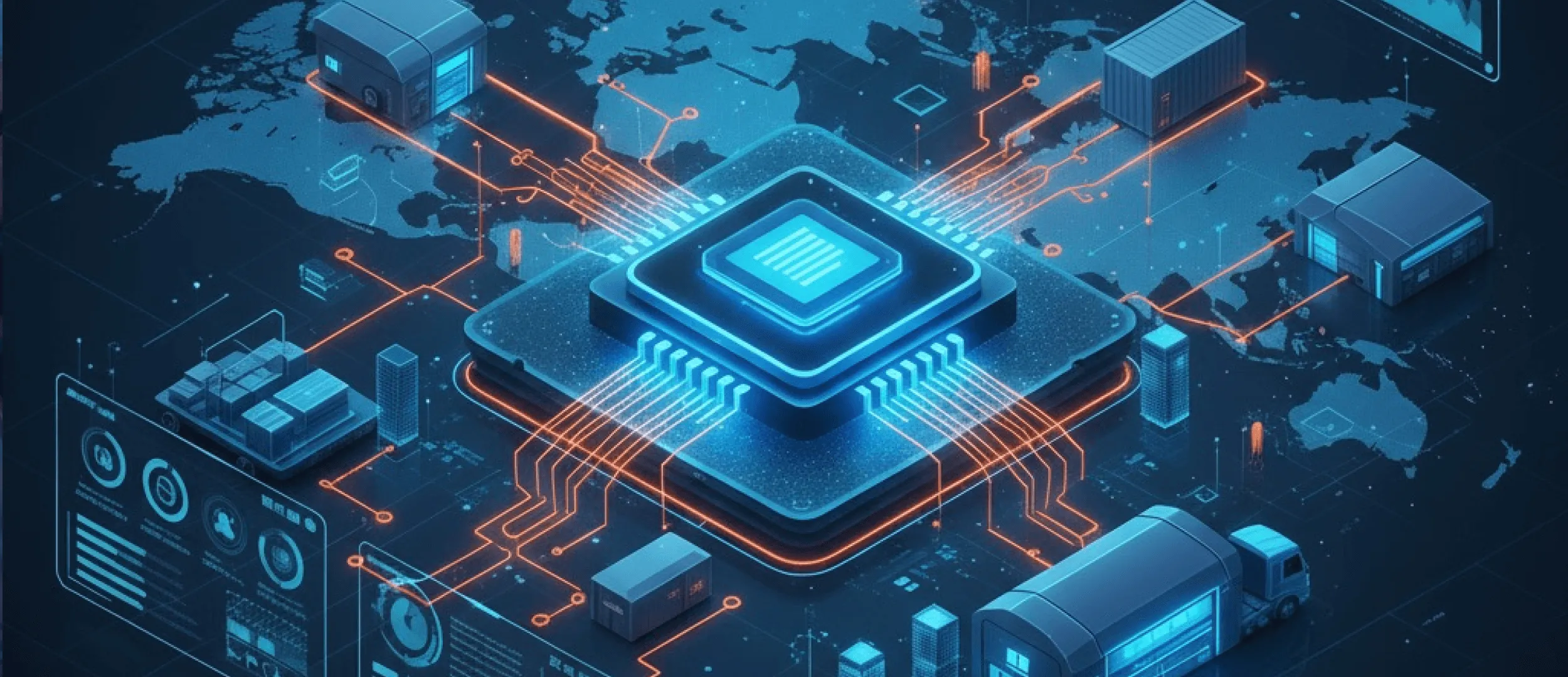
Logistics companies don't wake up one morning with a thought: "Why not build custom software?" They get there slowly.
It usually starts with a spreadsheet that quietly becomes business-critical. Then comes a SaaS tool that fixes one bottleneck but introduces three new ones. And gets more expensive as the business grows. The breaking point comes when drivers are working off outdated schedules or delivery promises slip because the systems don't sync.
Somewhere there, companies start exploring custom logistics software development and looking for a reliable partner to build it. But not all software developers understand transportation and logistics.
Below, we’ll list the best logistics software development companies that do have logistics expertise. We’ll also compare their technical capabilities, AI expertise, client portfolio, and cost structure.
Being in the list ourselves, we’re not here to claim we are the “best” vendor. We’ll help you understand which software development firm makes sense for your complexity and where Stfalcon fits in that landscape.
TL;DR
Here is a quick snapshot of the top logistics software development companies featured in this article and what they’re known for.
- Stfalcon: Custom logistics software development company with 16+ years of experience in fleet operations, dispatch, and transportation systems.
- Cleveroad: Software development company with dedicated logistics expertise and AWS partnership for scalable cloud solutions.
- Limeup: Logistics software development firm specializing in international supply chain solutions and data-driven warehouse management.
- Leobit: ISO-certified software development company focused on logistics, supply chain, and AI-driven transportation solutions.
- DreamzTech: India-based logistics software development company with 250+ global deployments across TMS, WMS, and fleet management platforms.
- Trinetix: Software development company that builds logistics systems for freight brokers and 3PL providers.
- Adexin: Custom software development company with a strong focus on AI-driven logistics, transportation, and supply chain solutions.
Not all logistics software development companies “speak logistics”. Here’s how to tell
All logistics software development vendors claim they know the industry. But only a few understand dispatch workflows, route constraints, or what breaks when you scale from 20 drivers to 200. That’s why we cover the most important aspects that should be evaluated before you hire logistics software developers. These include:
Proven logistics & transportation expertise
Technical skills aren't enough. Top logistics software development companies understand dispatch logic, route optimization, fleet management, real-time tracking, and many other operational nuances most devs never encounter.
Comprehensive technology stack
You need a logistics software development partner who can build the entire system, with GPS tracking for vehicles and parcels, routing and dispatch engines, fleet and driver management, exception handling, and integrations. You may not need all of this at once, but it’s important to work with a partner who can deliver what your operations require.
AI integration & smart workflows
Today, we can’t imagine logistics software development without AI. It’s implemented for demand forecasting, dynamic routing, warehouse optimization, and more. That’s why your development partner should have hands-on expertise in AI implementation. It would be a strong plus if they also have AI built into the development workflow.
Case studies in logistics and transportation
Past performance matters. Companies with substantial logistics portfolios demonstrate they can deliver systems that work in real operations for different businesses with varying needs.
Cost structure
You won't find exact prices listed publicly, as every project is different. But you can tell a lot from how companies talk about pricing. So, we will look at their engagement models and any available cost-related details to have an idea of how it goes.
These are the lenses we use to evaluate every vendor in this article. With that in mind, let’s move on to the companies themselves.
7 top logistics software development companies that build custom systems
When you search for the best logistics software development companies, it’s easy to get lost in the amount of available information — much of which isn’t useful for real evaluation. That’s why we focus on vendors who have proven they can deliver production-ready logistics systems. We start with Stfalcon, as logistics is the area where we have first-hand experience and a strong track record.
Stfalcon
With 16+ years in logistics and transportation, we at Stfalcon understand fleet operations, delivery, dispatching, booking, and workforce management.
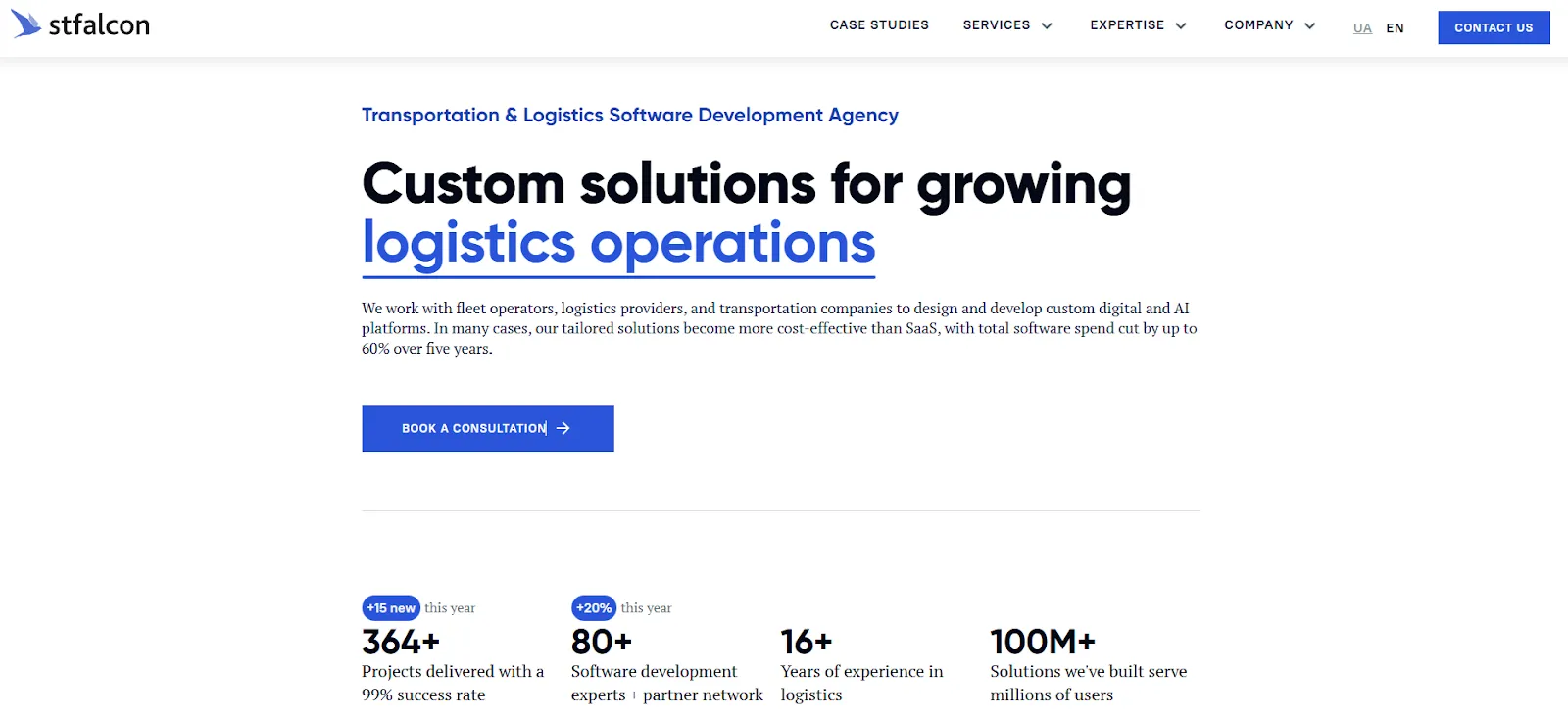
Proven logistics & transportation expertise: Our team has delivered systems that support logistics and fleet operations at scale. It’s tens of thousands of employees, thousands of locations, and millions of end users. Safe to say we understand the operational constraints, edge cases, and regulatory realities that generic software vendors often overlook.
Comprehensive technology stack: We provide cross-functional teams that stay involved from start to finish. We cover discovery, BA, UI/UX, backend, AI, mobile, cloud, and everything in between.
Our technology stack supports the full operational flow, including GPS tracking for vehicles and parcels, routing and dispatch engines, fleet and driver management, real-time ETAs, and integrations with ERP, WMS, and carrier APIs. We also have pre-built logistics modules that speed up time to market and reduce development costs.
AI integration & smart workflows: We don’t push unnecessary complexity. Stfalcon applies AI where it delivers an operational impact. In logistics projects, it’s usually demand forecasting, dynamic routing, document processing, and more. For example, we’ve recently built a Gemini-powered AI agent for a customs service provider that reduces document processing time by 67%.
In addition, we use AI internally within SDLC, which helps us shorten time to production by 30% compared to typical delivery timelines.
Case studies in logistics and transportation: We’ve delivered more than 364+ projects with a 99% success rate. Here are some of them:
Nova Post → Ukraine’s largest private postal operator
Stfalcon’s development team built a smart system that automates shift scheduling for 38,000 employees across 13,000+ offices nationwide. It reduced shift planning time to minutes instead of hours, automating 99% of manual work.
Ecolines → one of Europe’s largest bus operators
As negative reviews started to pile up in app stores, Ecolines realized their mobile application needed a complete overhaul. We built a user-friendly bus ticket booking that doubled conversions and restored user trust.
Cost structure
Pricing depends on scope, integrations, and operational complexity. If you’d like a more concrete estimate, just let us know what you have in mind.
Yet, we use a transparent green/yellow/red cost model to help clients plan long-term development without hidden costs. Once we understand the project, we break features down into clear categories with different cost and time implications:
- Green: lowest cost, fastest delivery — We use ready-made modules that can be implemented quickly with minimal effort.
- Yellow: moderate cost, takes more time — Partially reusable functionality that needs to be adapted to your specific workflows.
- Red: highest cost, fully custom development — Features built from scratch to support unique business logic. These require the most time and investment but deliver the highest level of customization.
Cleveroad (Estonia)
Cleveroad develops software for different industries, with logistics among its core areas.
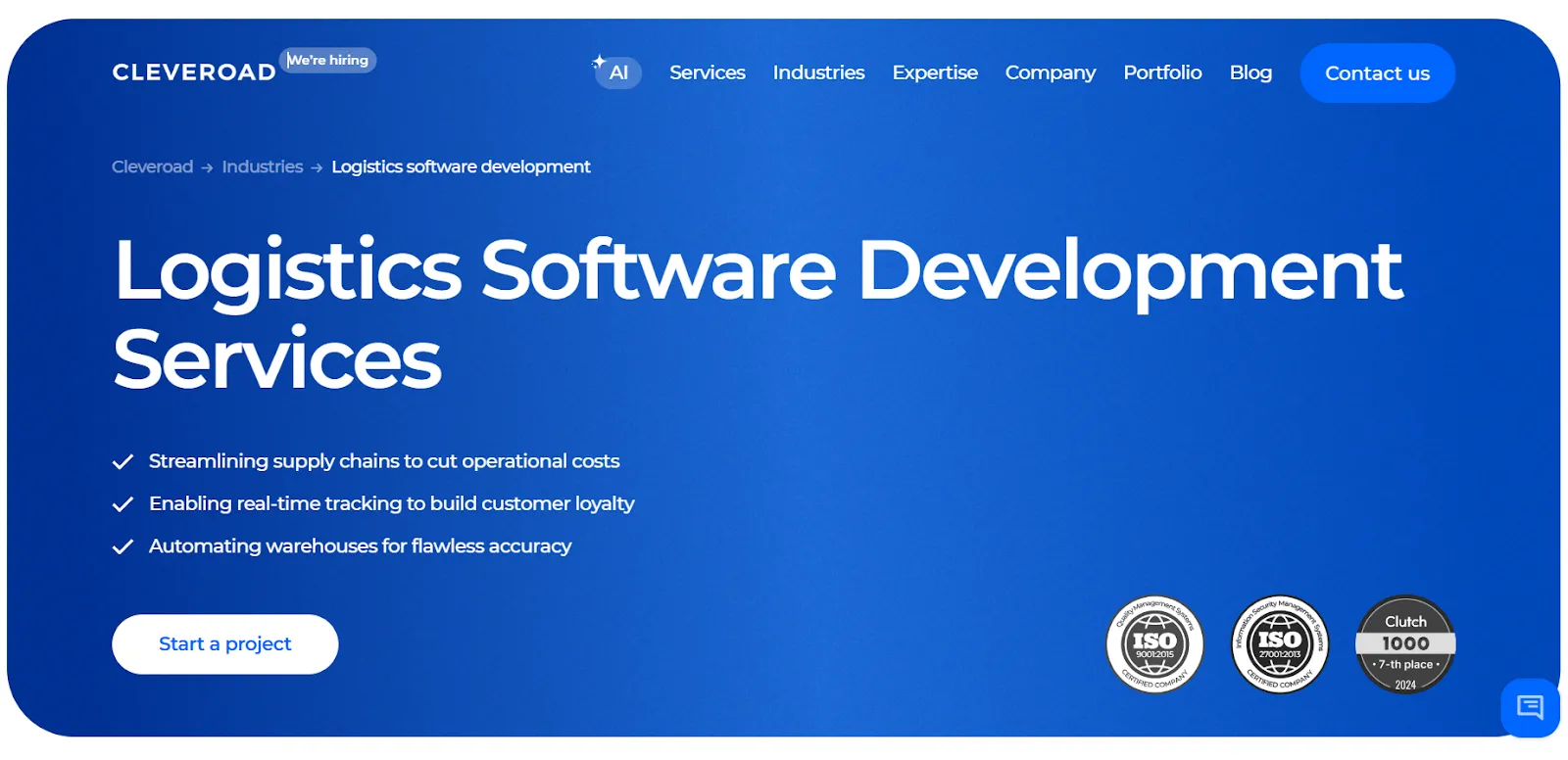
Proven logistics & transportation expertise: Cleveroad builds systems that help logistics teams manage fleets, plan routes, coordinate warehouses, automate deliveries, and track shipments in real time. They work with procurement firms, freight and trucking companies, manufacturers, 3PL companies, warehouses, and distributors.
Comprehensive technology stack: Cleveroad’s technology capabilities span web, mobile, backend, cloud, AI/Data Science, and IoT solutions with modern stacks like .NET, Node.js, Python, React, Flutter, and more. Cleveroad is an AWS Select Tier Partner, which means they build and run logistics systems on scalable cloud infrastructure. The company also holds ISO 27001 and ISO 9001 certifications.
AI integration & smart workflows: Cleveroad lists AI among its technology areas and applies it to logistics systems for forecasting, routing, and warehouse optimization.
Case studies in logistics and transportation: Cleveroad has logistics projects to show. Here are some of them.
Route planning and transport management system
Cleveroad developed a custom TMS that covers cargo transportation settings, employees’ workflows, fleet control, and automates route planning.
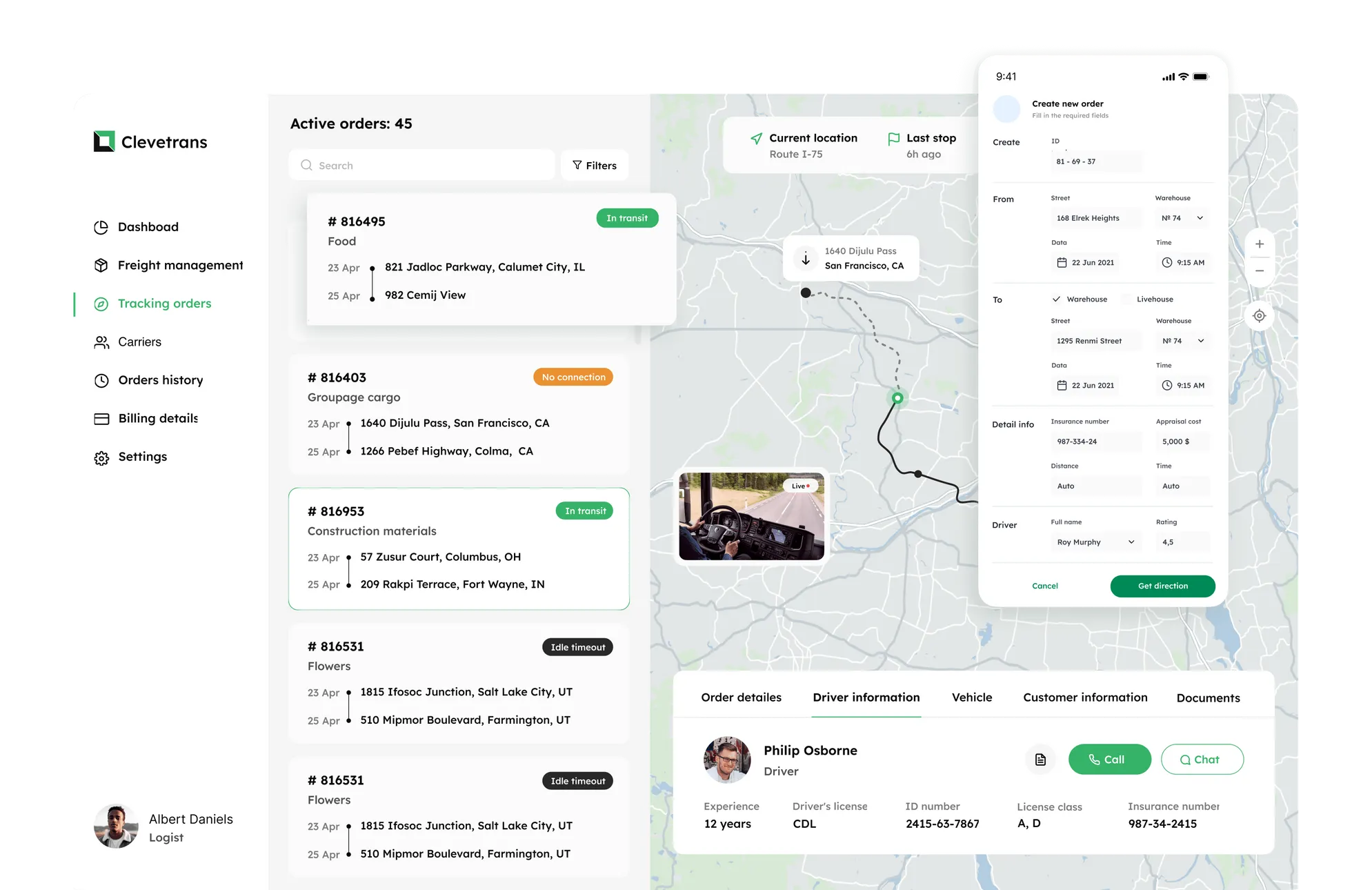
Uber-like app for disabled people
The company built a mobile app that connects drivers with riders and helps to transport people with disabilities. It includes event-driven tracking, a filtering system, payments, and more.
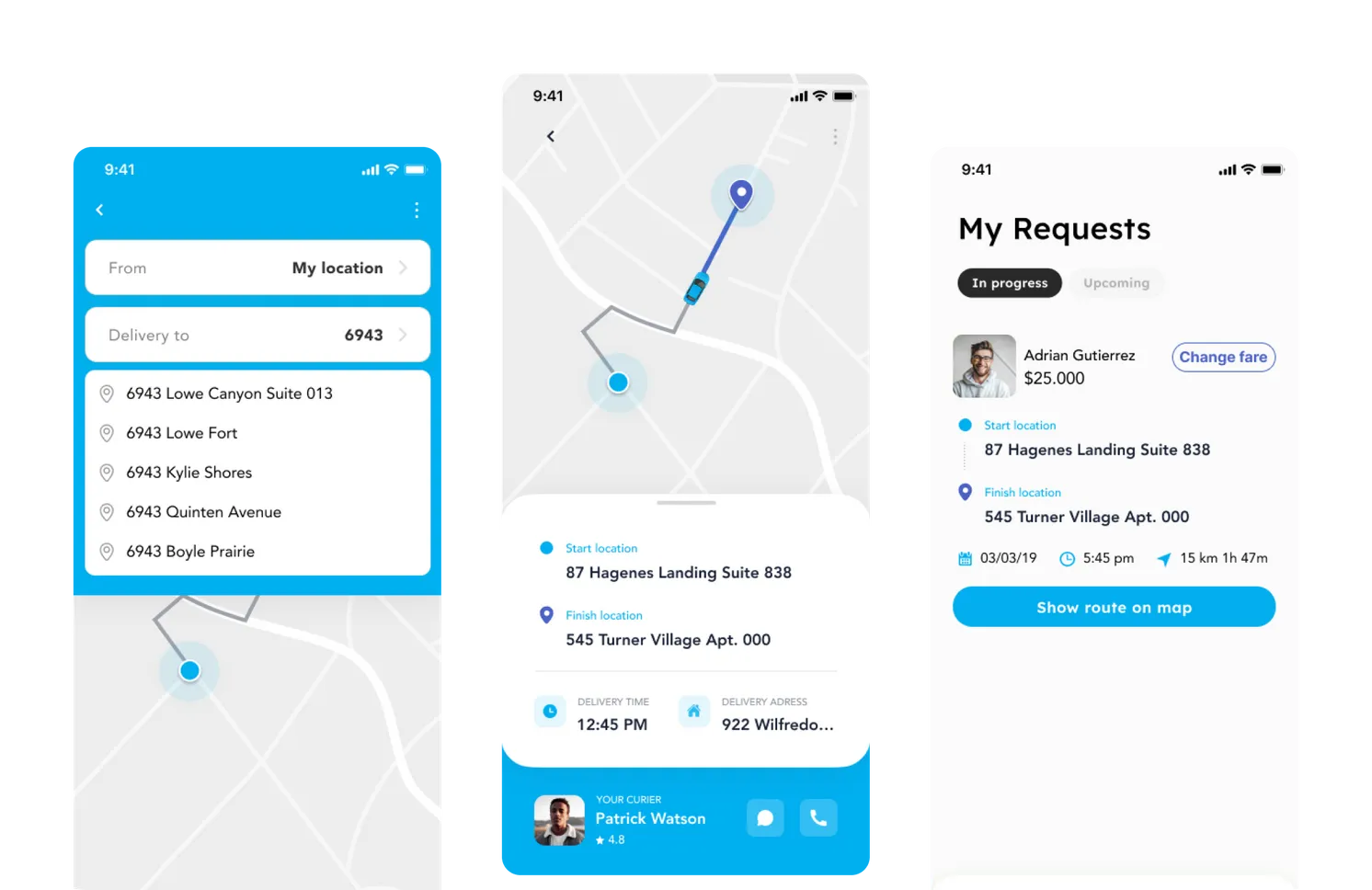
Cost structure: Since project cost depends on specific requirements and the chosen engagement model, it’s best to discuss pricing directly with Cleveroad. Based on publicly available information, the company offers two staff augmentation options: on-demand staff augmentation and a dedicated development team model.
Limeup (UK & Global)
Limeup is a logistics software development firm that helps companies navigate the complexities of international supply chains.
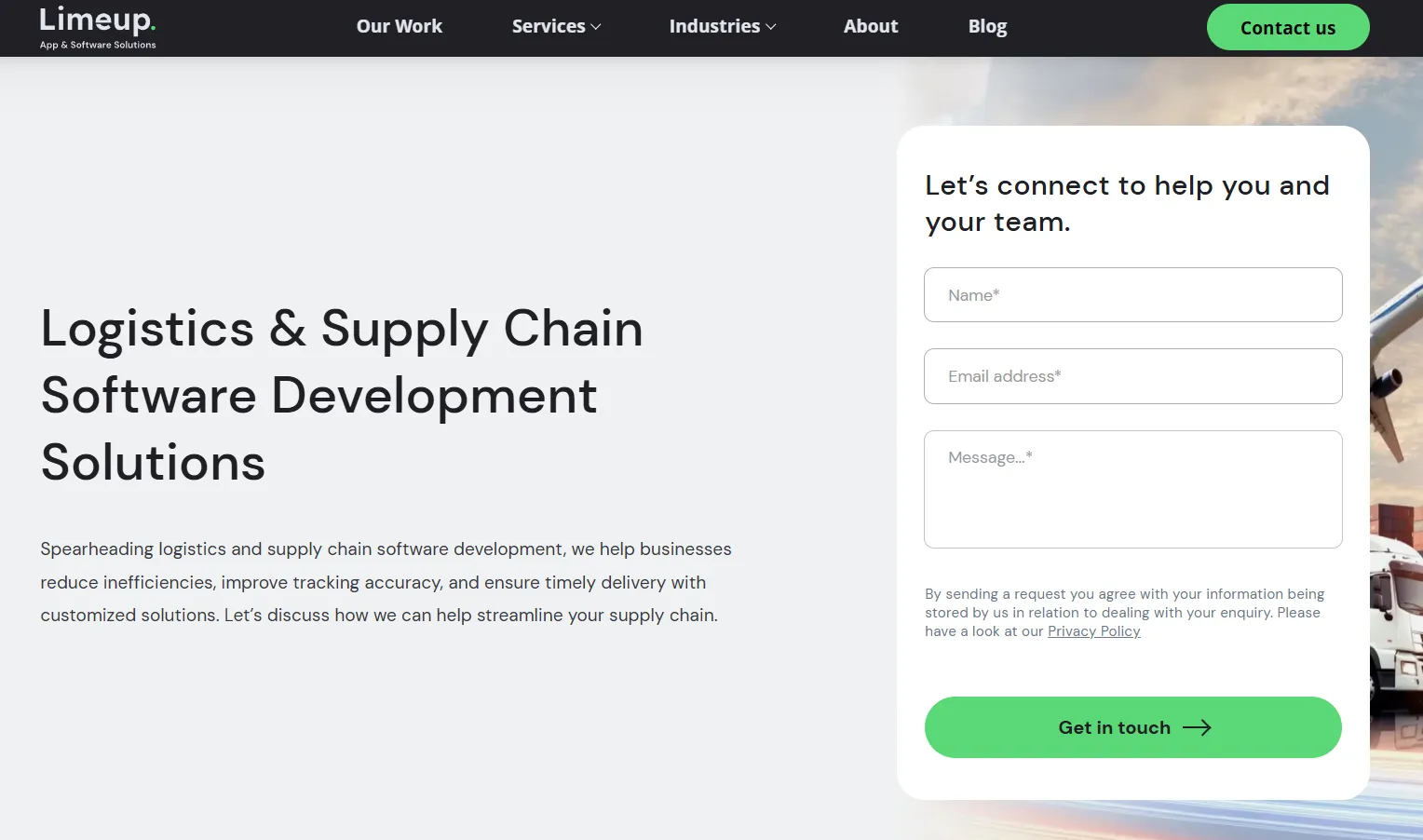
Proven logistics & transportation expertise: Limeup specializes in custom logistics software, transportation management systems, warehouse automation, and inventory tools. Their solutions focus on data-driven insights that help businesses improve forecasting accuracy and support informed decision-making.
Comprehensive technology stack: Limeup offers experts in backend languages and frameworks like Java, Node.js, Python, Go, and C++, along with frontend technologies such as React.js and Vue.js, and cloud platforms like AWS, Azure, and Google Cloud.
AI integration & smart workflows: Limeup doesn’t list logistics-specific AI use cases in public materials, but it has AI among its core services.
Case studies in logistics and transportation: Some of their most interesting logistics work includes WareSync and Logifleet.
WareSync, a warehouse management portal
Limeup helped build a WMS that handles all the workflow and achieves 99.95% uptime under load. The system processed 1m+ stock updates in the first 3 months after launch.
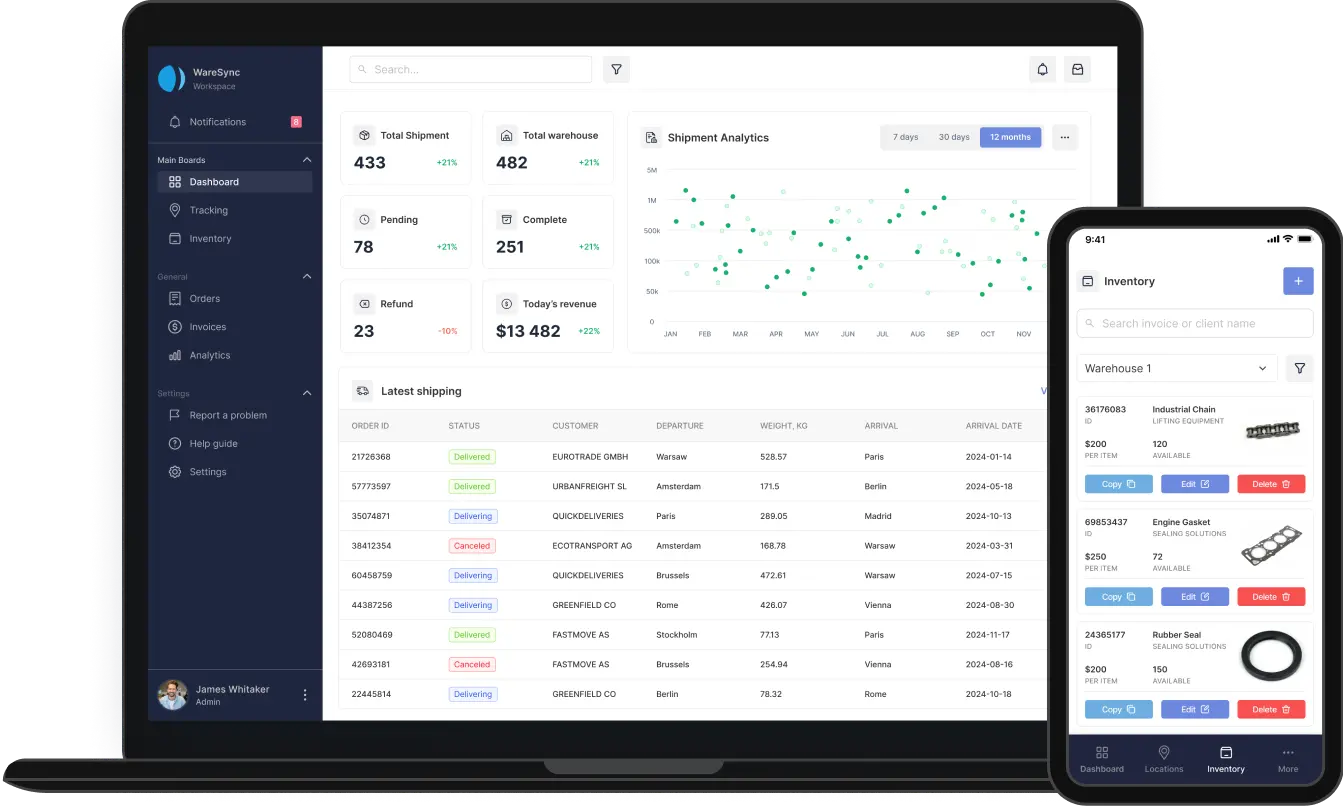
Logifleet, a freight and transportation platform
They built a freight platform with web and mobile apps, live tracking, in-app communication, and a dashboard. It can handle 500,000+ weekly geolocation events and shows 40% faster response times.
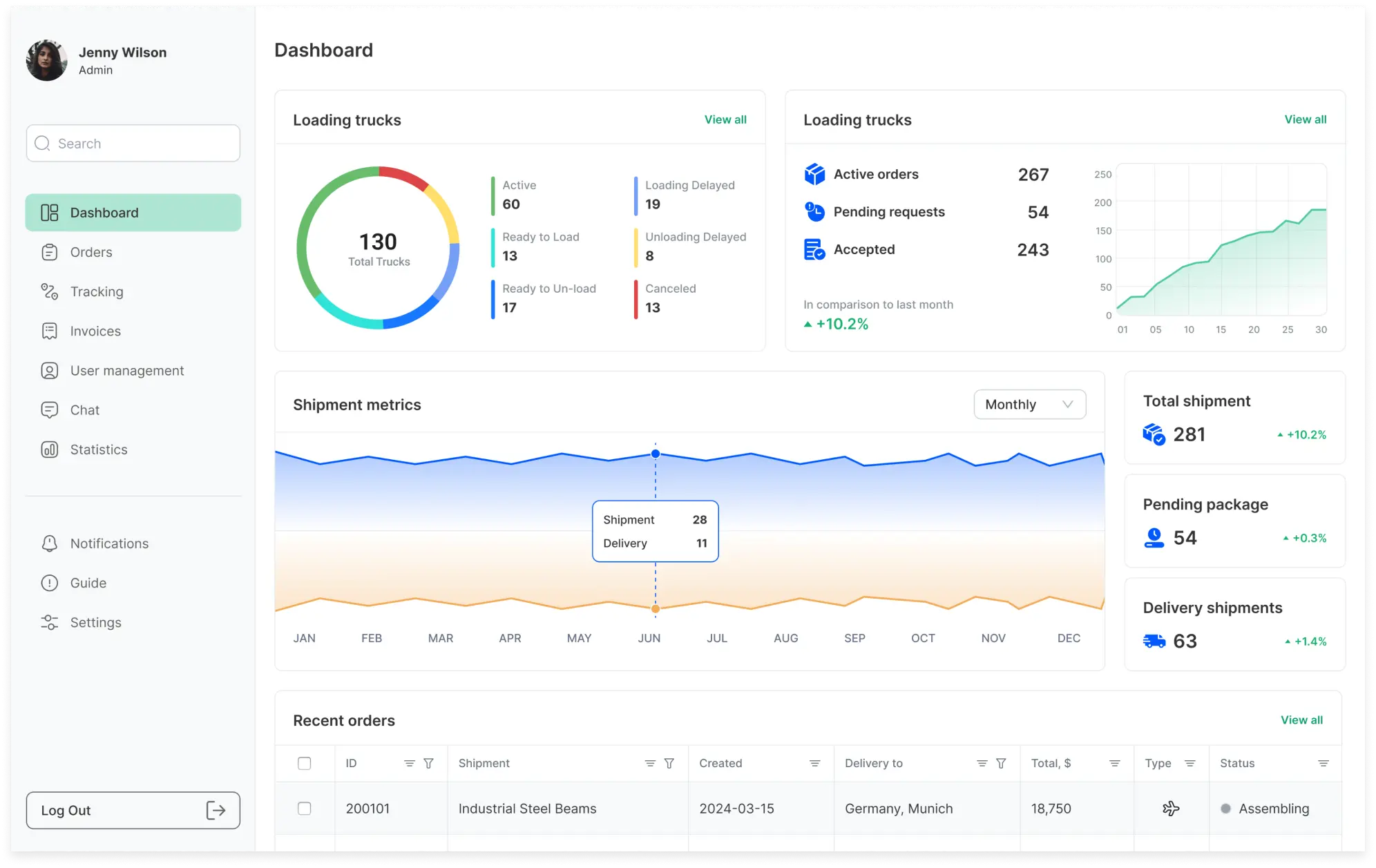
Cost structure
On Limeup’s logistics services page, you can find a short questionnaire that helps get a quick, initial project estimate. Also, the company offers three cooperation models: staff augmentation, dedicated team, and software outsourcing.
Leobit (Ukraine)
Leobit is a software development company with 10+ years of experience in logistics and supply chain management.
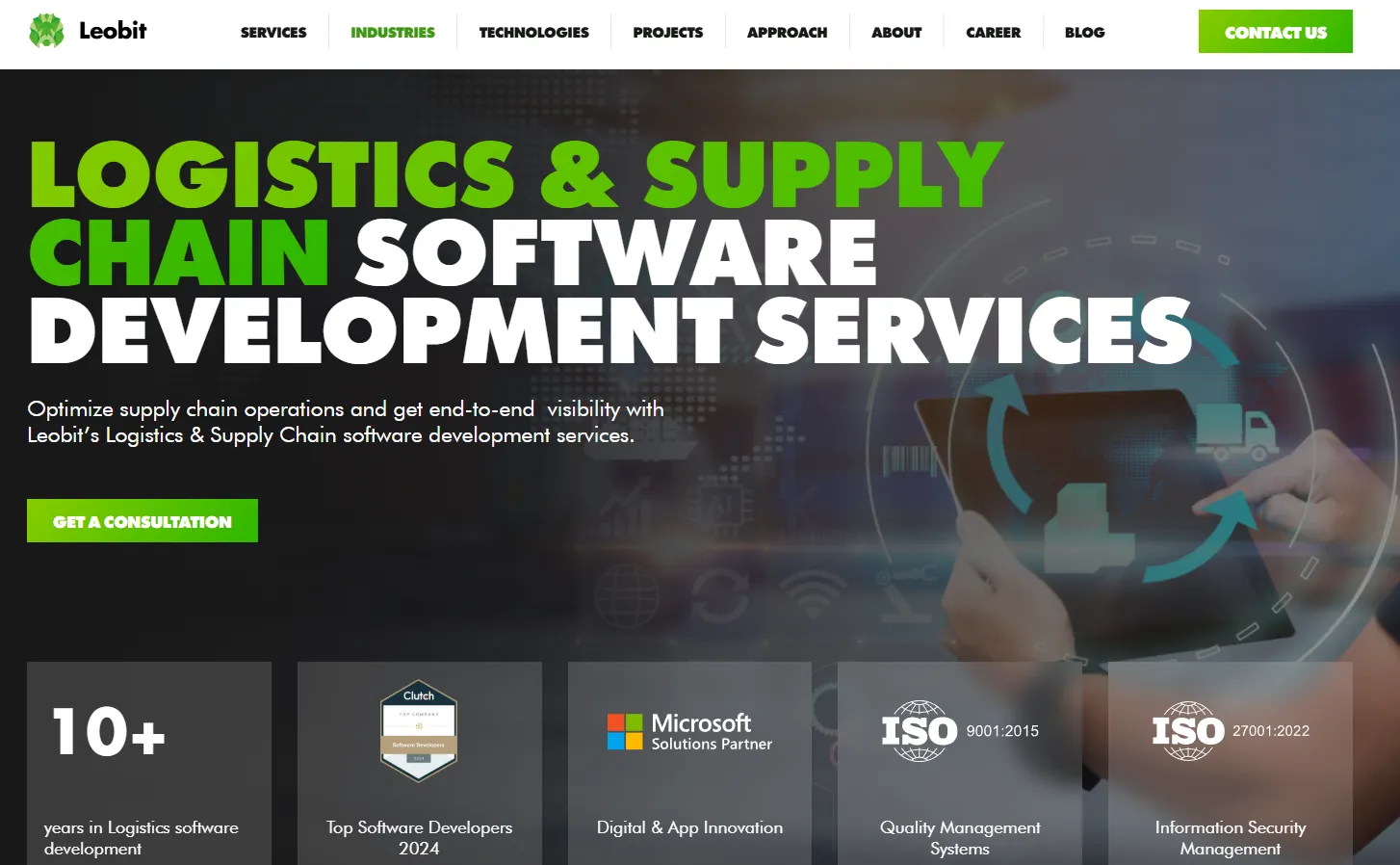
Proven logistics & transportation expertise: Leobit’s logistics software development services cover real-time shipment tracking, inventory management, route optimization tools, freight and transportation management systems.
Comprehensive technology stack: Leobit specializes in backend technologies (.NET Core, Node.js, Ruby, PHP, Python), frontend frameworks (Angular, React), cloud development on AWS/Azure/GCP, IoT integration, BI/data analytics, and embedded software.
From an integration standpoint, Leobit’s engineers work with industry-standard protocols, including APIs, Electronic Data Interchange (EDI), Transport Layer Security (TLS), and more. The company is ISO 9001:2015 and ISO 27001:2022 certified and has received industry recognition for its .NET expertise and overall software development quality.
AI integration & smart workflows: Leobit uses AI, ML, and predictive analytics for its logistics and supply chain solutions. The company’s services include AI-driven demand forecasting, route optimization, real-time monitoring, and analytics dashboards. For example, its portfolio includes an AI-driven orchestration platform for a global logistics enterprise in Sweden, where AI was used to automate shipping operations and helped cut manual efforts by nearly 64%.
Case studies in logistics and transportation: Leobit has logistics projects that show how their solutions work in practice.
Logistics route optimization solution
Leobit developed a route optimization system for a Nordic waste container management provider. The solution streamlines waste tracking and collection processes and helps reduce operational costs by up to 35–40%.
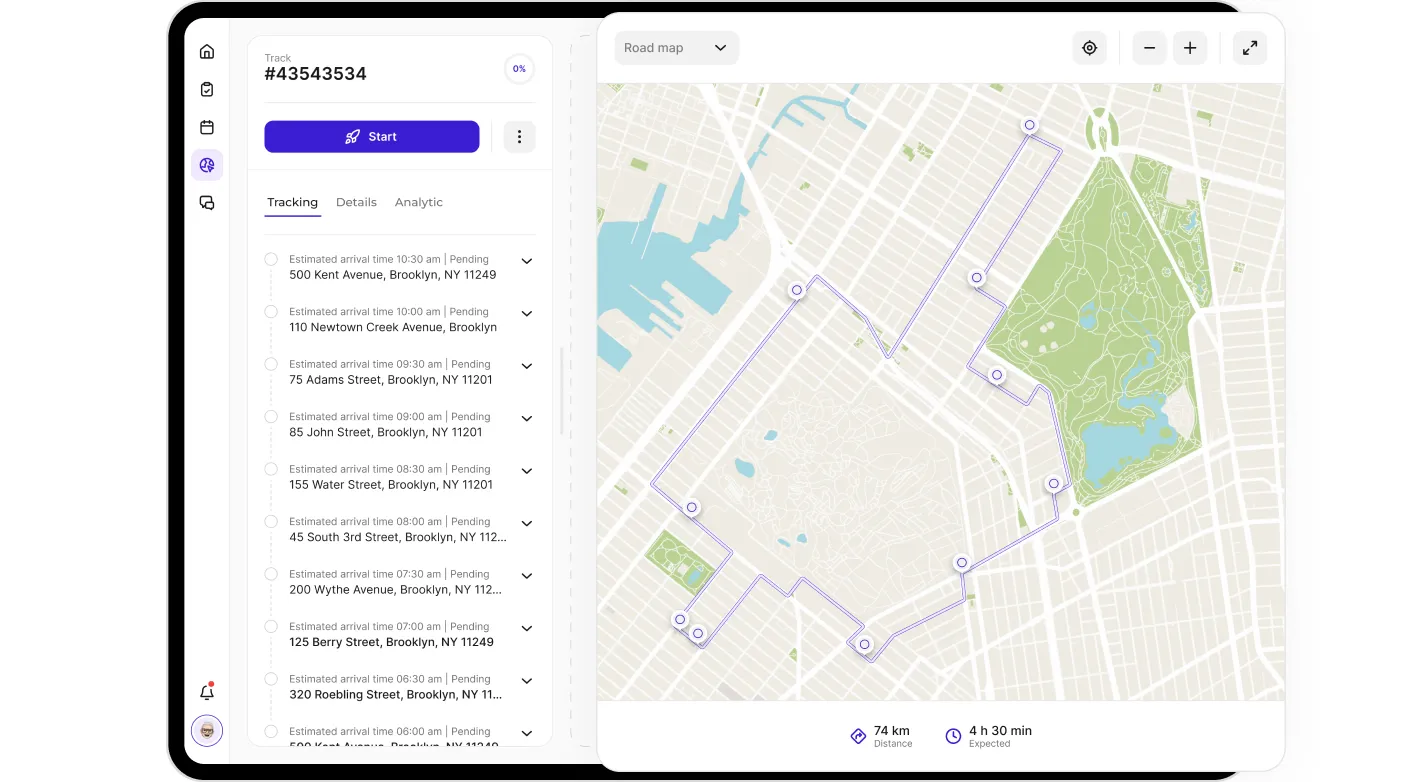
Cross-platform bus ticketing solution
Leobit’s team built a bus ticket platform that modernized payments, enabled group bill-splitting, and delivered a consistent web, mobile, and desktop experience.
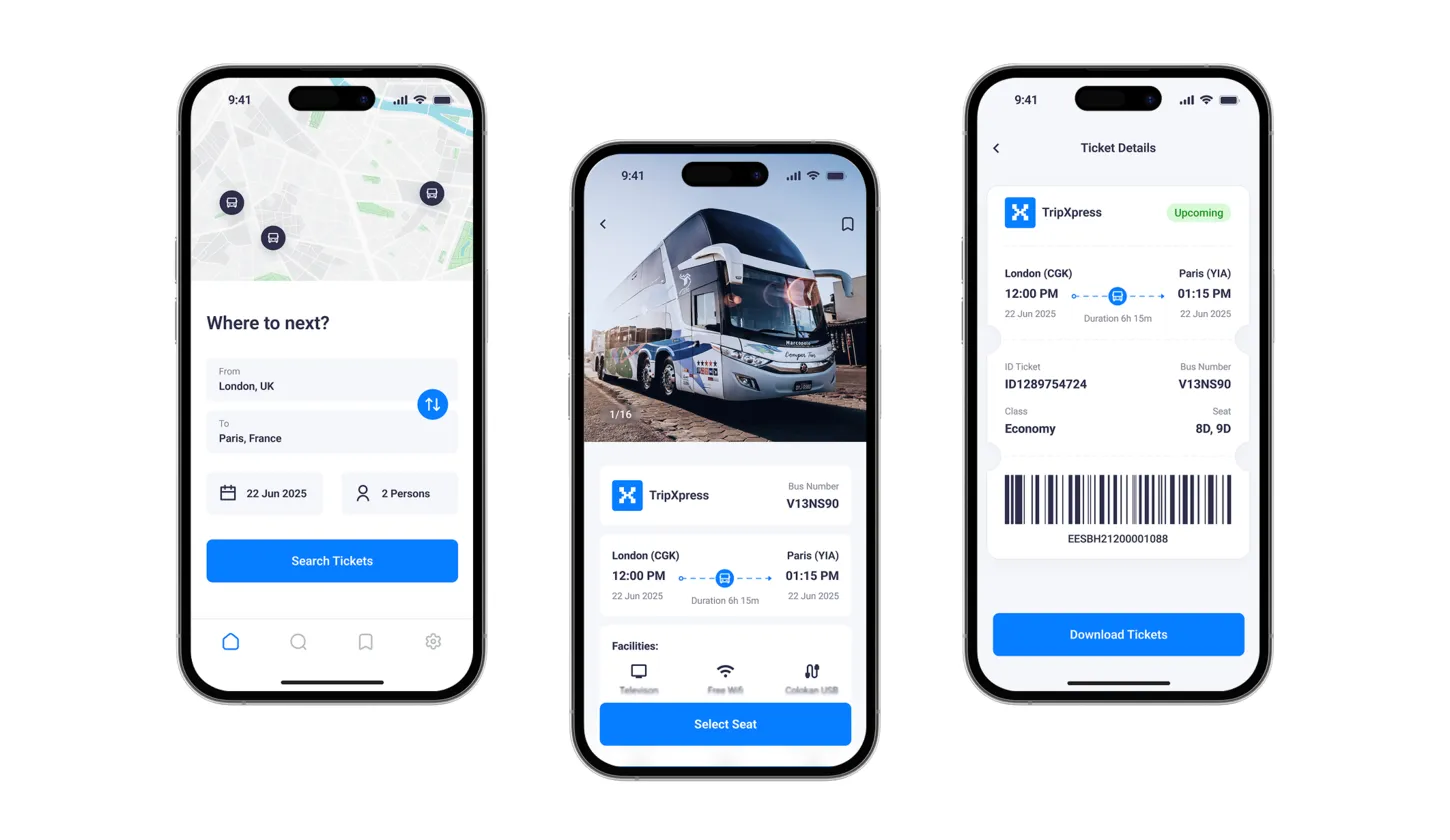
Cost structure: Leobit offers several collaboration models, including dedicated teams, time & materials, project-based work, and outstaffing. Depending on how you choose to work together, it can be a fixed price, fixed scope, hourly rate, or monthly rate.
DreamzTech
DreamzTech is a software development company with 250+ global deployments and 16+ years of logistics technology expertise. They are based in India and have offices in the U.S. and the UK.
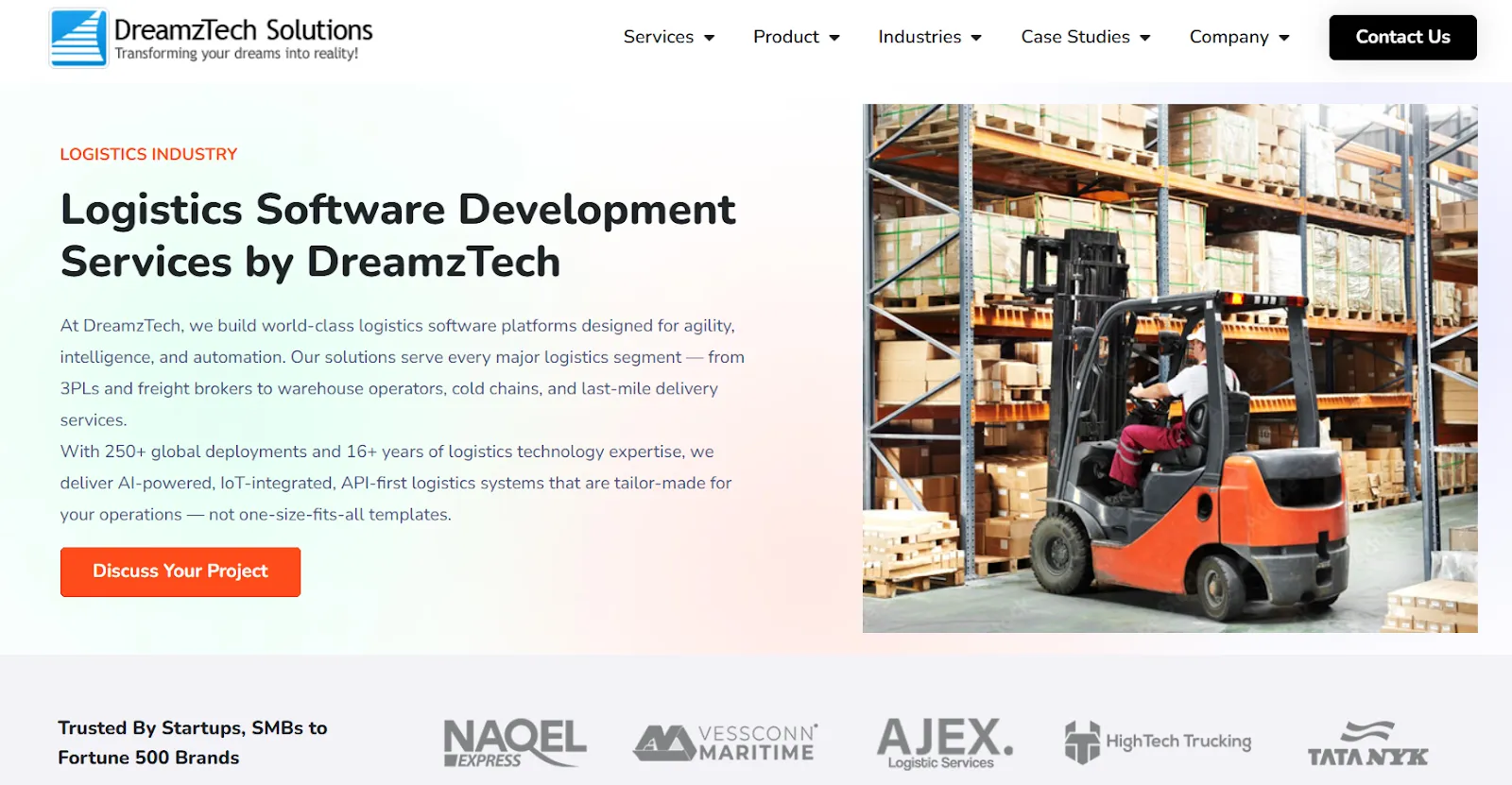
Proven logistics & transportation expertise: DreamzTech provides various logistics solutions, which cover TMS, WMS, inventory and order management platforms, freight forwarding and 3PL integrations, mobile applications, and IoT-enabled apps.
Comprehensive technology stack: DreamzTech has expertise in web and mobile applications, cloud-native platforms, enterprise software, AI systems, and IoT integrations. They offer modules for route optimization, GPS-based fleet tracking, SLA automation, inventory and order management, and warehouse optimization.
DreamzTech supports integrations with fleet and telematics platforms, load boards, IoT sensors, BI and analytics tools, and other external systems used in logistics operations.
AI integration & smart workflows: DreamzTech points to a range of AI use cases for logistics, from route optimization and demand forecasting to predictive maintenance, anomaly detection, and AI-driven chat tools. They’ve also built an AI-powered freight management platform for shippers and carriers and an AI-enabled trucking dispatch system.
Case studies in logistics and transportation: DreamzTech publishes logistics-related case studies, so let’s take a look at some of them.
Cloud-based SaaS platform for logistics & fleet management
DreamzTech delivered a cloud-based transportation and fleet management platform with real-time vehicle tracking, smart load assignment, and automated maintenance planning.

RFID-based container tracking & logistics automation platform
The company built an integrated system that automates the management of 3+ million containers. It handles 100,000+ container transactions monthly and reduces manual tracking effort by 80%.

Cost structure: DreamzTech does not publicly list fixed prices for logistics software development, as costs vary based on project size and scope. But we do know that they offer software outsourcing, dedicated teams, and staff augmentation.
Trinetix
Trinetix doesn’t work exclusively in logistics, but it’s one of the domains where they built solid expertise.
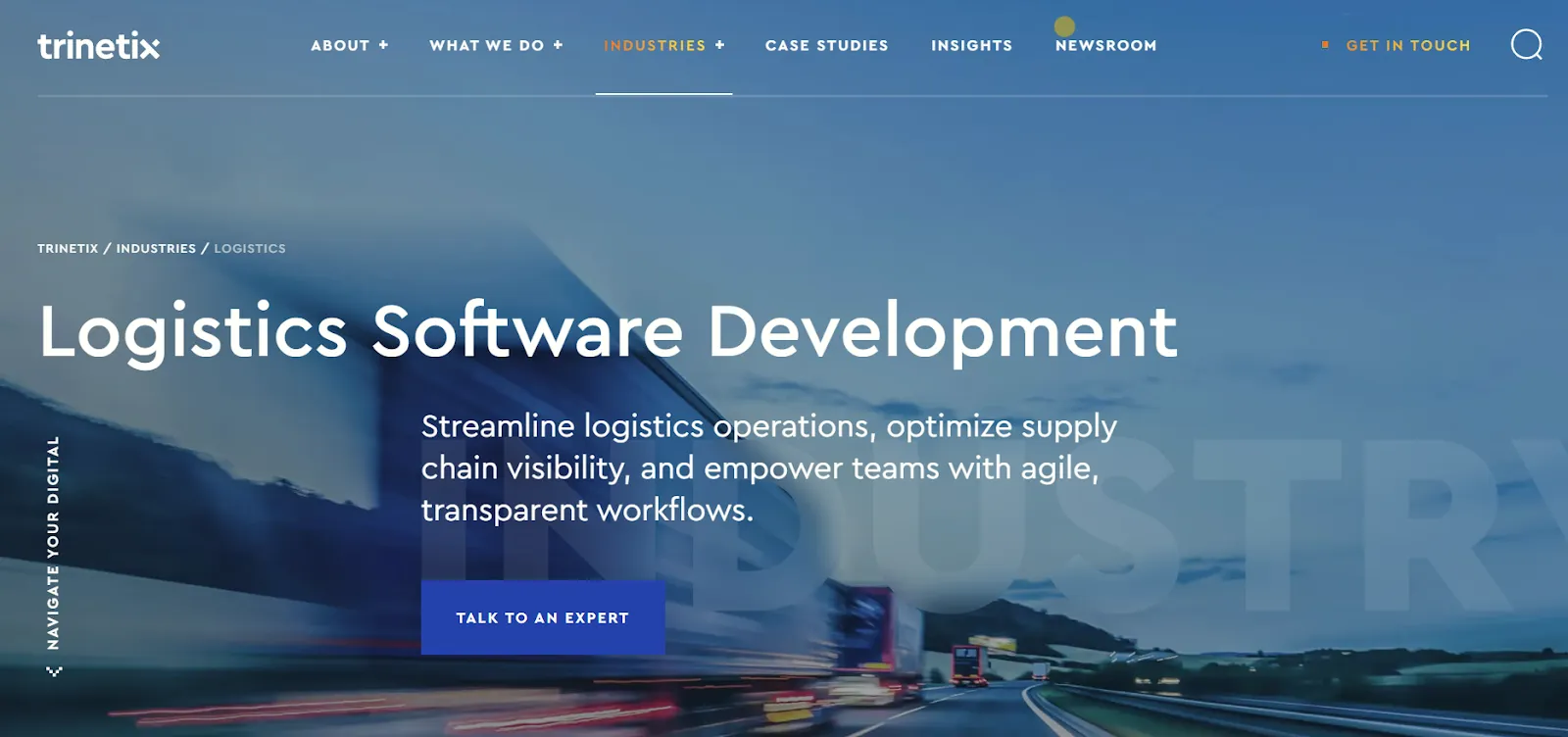
Proven logistics & transportation expertise: Trinetix develops logistics mobile apps, cloud platforms, AI-driven systems, chatbots, and even blockchain-based solutions.
Comprehensive technology stack: Trinetix brings a full tech toolkit suitable for complex logistics systems. They implement integrations with clients’ existing software, like ERP, CRM, WMS, TMS, routing software, analytics platforms, AI engines, and e-commerce APIs.
AI integration & smart workflows: Trinetix doesn’t highlight AI much, but its logistics case studies include auto-bidding, predictive shipment models, and route optimization built with AI.
Case studies in logistics and transportation: Trinetix has been involved in several logistics and transportation projects. Time to see what they’ve built.
AI-powered risk assessment system
Trinetix helped a 3PL services provider build an AI-driven system to mitigate transportation risks. The solution improved on-time delivery by 15% and generated $150,000 in annual savings.
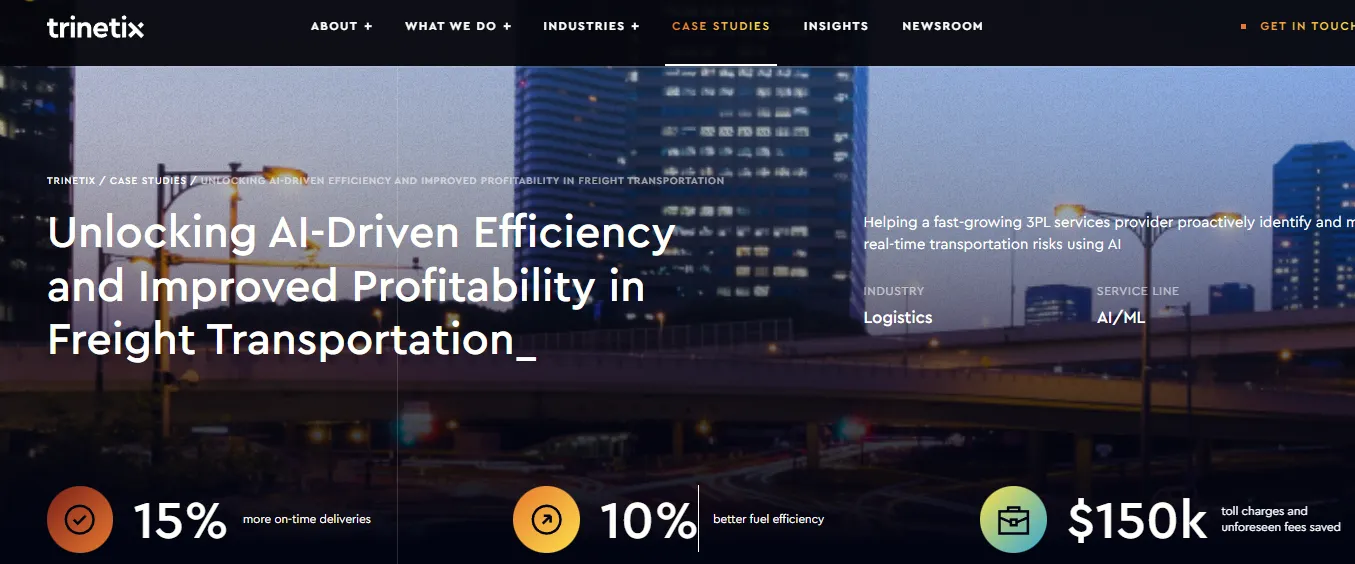
AI-driven demand forecasting solution
Trinetix developed a smart supply chain planning system that allowed the client to cut inventory costs by 15% and improve forecast accuracy by 10%.
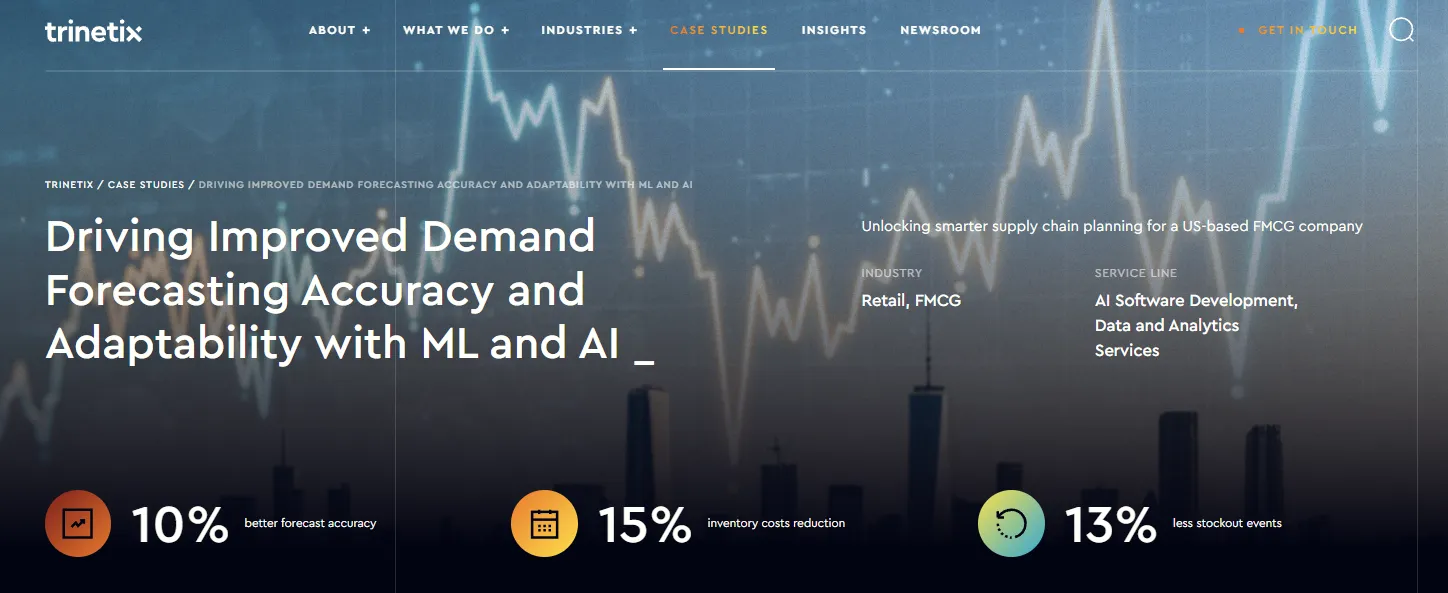
Cost structure: To get specific pricing details, you’ll need to contact the Trinetix team. As with any other logistics software development firm, final costs depend on your project requirements.
Adexin
Adexin is a custom software development and consulting company with a strong focus on logistics, transportation, and supply chain solutions.
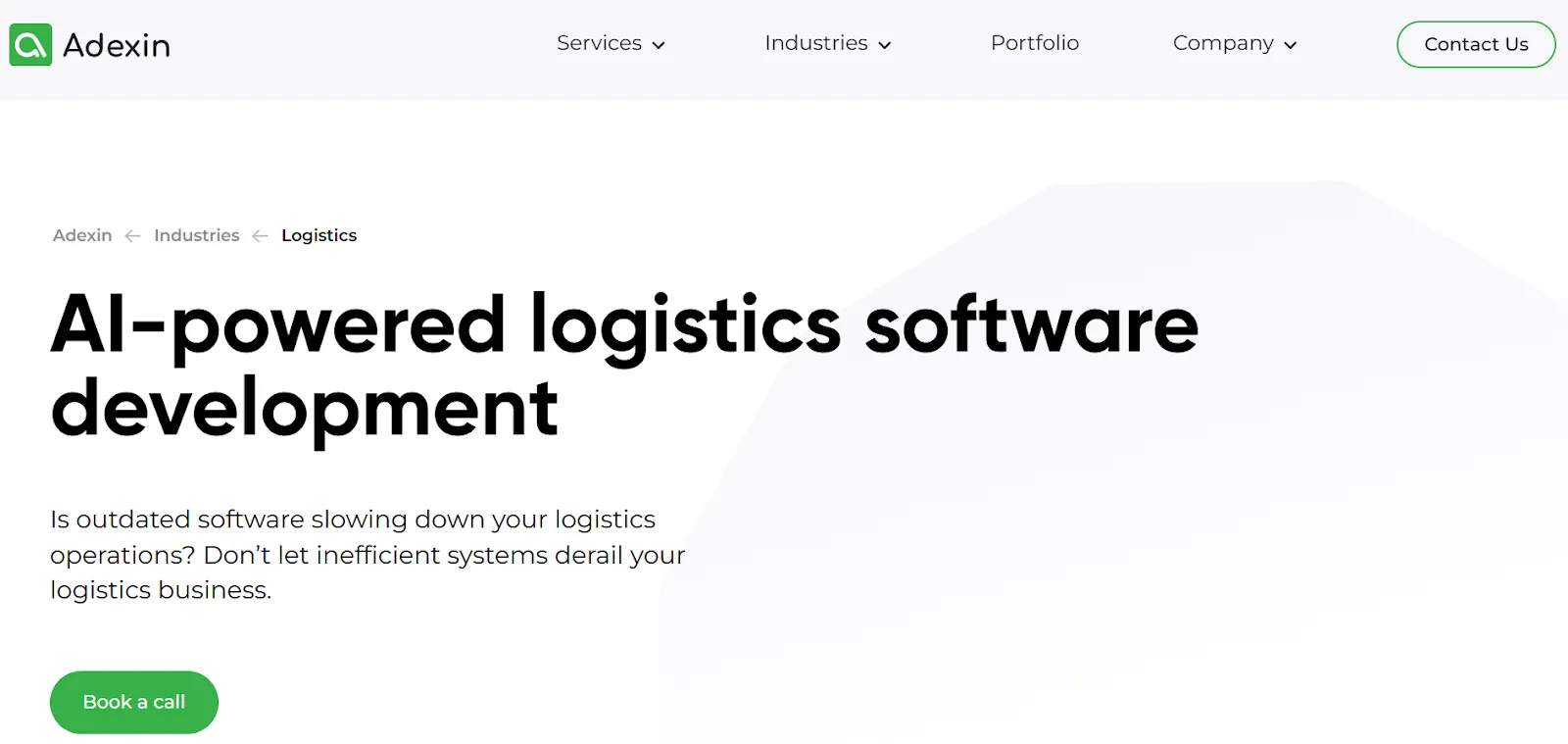
Proven logistics & transportation expertise: The service pages don’t leave much doubt: logistics shows up everywhere. Adexin builds WMS, order and inventory management platforms, document management systems, ERP solutions, and CRM systems.
Comprehensive technology stack: Adexin works with a full-stack technology setup, covering custom backend and frontend development, web and mobile applications, cloud architecture, and AI/ML integration. The team also integrates mapping and location technologies (Mapbox, Google Maps, and OpenStreetMap) to support real-time tracking and spatial features.
AI integration & smart workflows: Adexin is a logistics software development company that says loudly: it’s all about AI. They market predictive analytics, smart routing, fleet optimization, intelligent automation, and AI-enhanced tracking as part of their custom software services.
To speed up delivery, Adexin relies on its proprietary Adexin Tools, an AI-driven, ready-made codebase that supports core capabilities like data management and outdoor tracking.
Case studies in logistics and transportation: Adexin showcases multiple logistics projects on its site. Let’s walk through a few examples.
Freight management system for agrologistics
Adexin built an Excel-to-web freight management system that replaced dozens of spreadsheets with a centralized platform. The solution simplified shipment management and reduced manual errors by 80%.
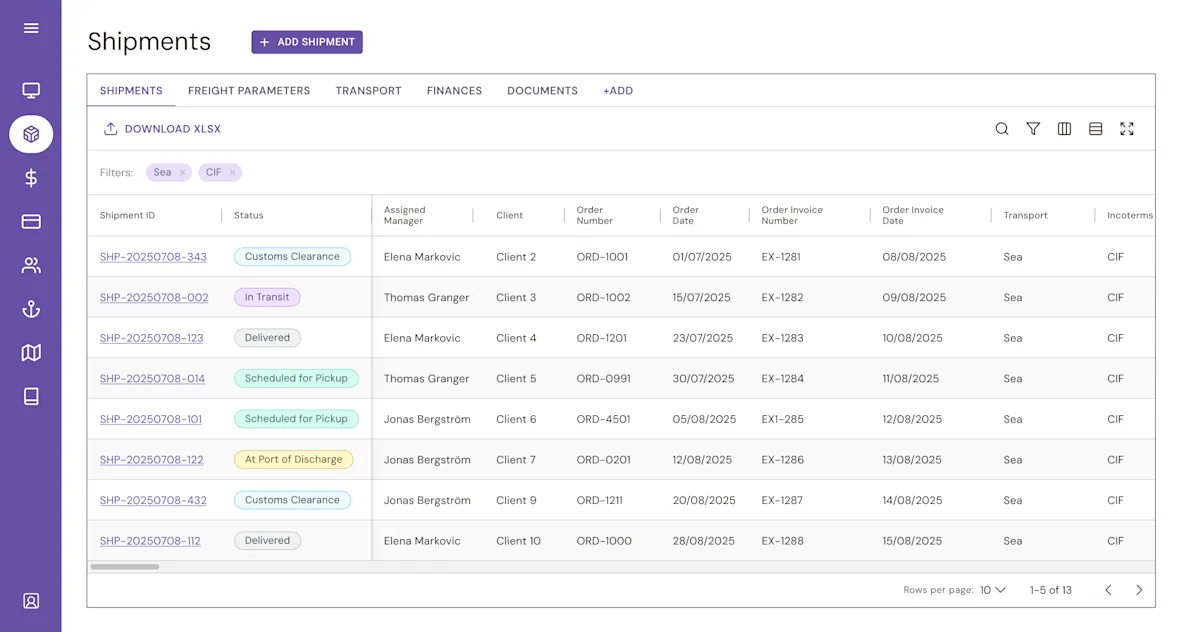
Unified transportation operations platform
The company developed an AI-driven, centralized system that covers dispatch, driver time tracking, payroll preparation, customer billing, and compliance. Payroll preparation became 90% faster, while manual adjustments dropped by over 50%.
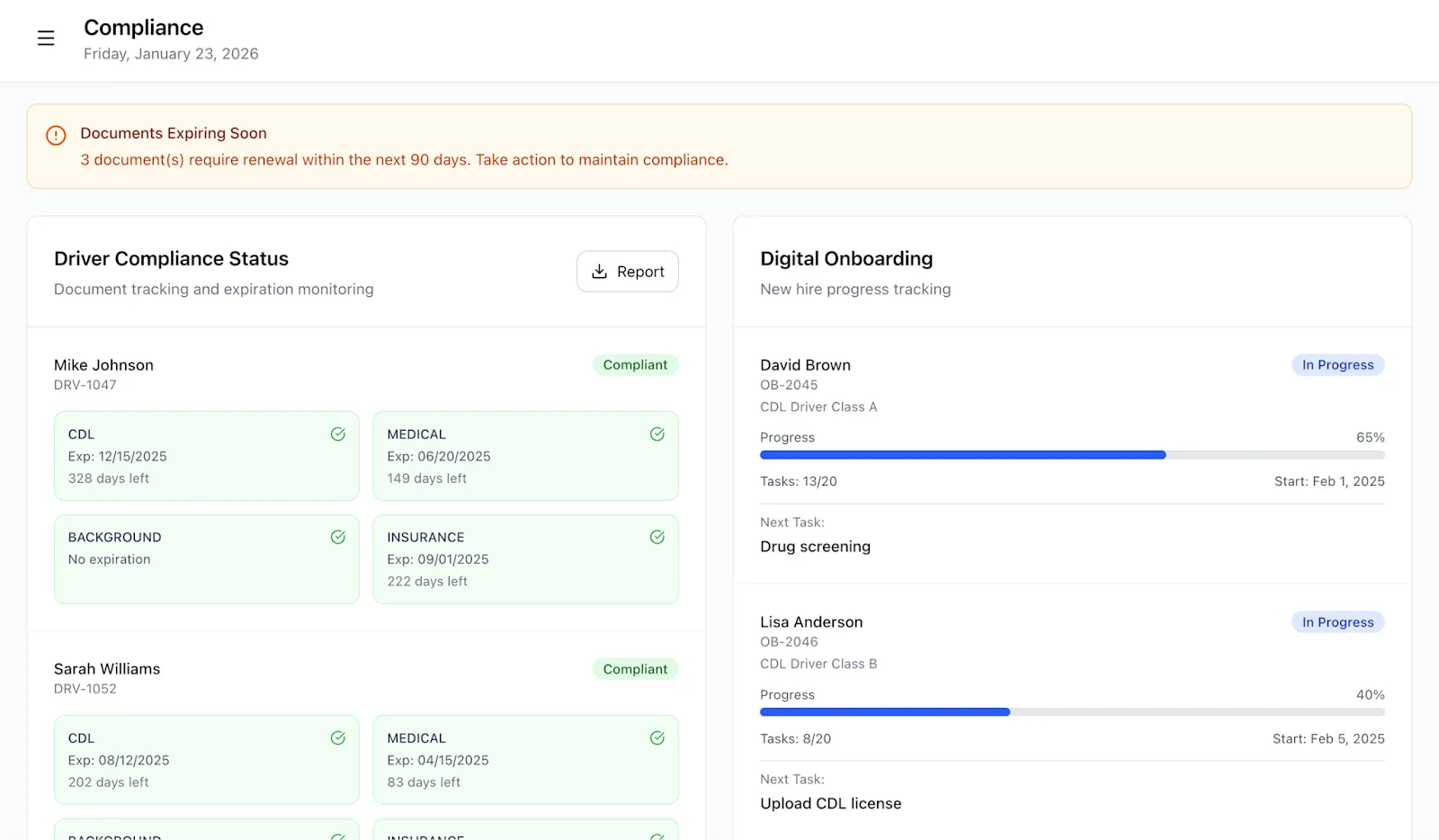
Cost structure: On their website, Adexin openly states that their services “have never been the cheapest in the market”. For more detailed information on pricing and approach, you can book a consultation with their team.
Logistics software development companies at a glance
Key facts on locations, Clutch ratings, and use cases for each company featured above.
| Company | Offices | Clutch rating | Best for |
|---|---|---|---|
| Stfalcon | Ukraine, Estonia | 4.9/5 (56 reviews) | Complex logistics operations with custom needs |
| Cleveroad | USA, Norway, Ukraine | 4.9/5 (77 reviews) | Cloud-based logistics platforms with AWS scalability |
| Limeup | UK, Germany, Poland | 5.0/5 (11 reviews) | International supply chain and warehouse management systems |
| Leobit | USA, Estonia, Poland, UK, Ukraine | 4.9/5 (53 reviews) | ISO-certified logistics systems with AI and analytics |
| DreamzTech | USA, India, Bahrain, UK | 4.9/5 (44 reviews) | Large-scale TMS, WMS, and fleet management deployments |
| Trinetix | USA | 5/5 (4 reviews) | Freight brokers and 3PL-focused logistics platforms |
| Adexin | USA, Estonia | 4.9/5 (28 reviews) | AI-driven logistics and transportation automation |
Quick checklist: How to choose the right logistics software development company
Before making a final decision, use these questions to check any vendor you’re considering:
- Do they understand dispatching, routing, fleet operations, warehouses, SLAs, and real-world exceptions? Or only the tech side?
- Can they design, build, integrate, and support the entire system from backend logic and mobile apps to integrations and analytics?
- Are they willing to adapt to your workflows instead of forcing your operations into a generic template?
- Do they use AI where it adds operational value (routing, forecasting, automation)?
- Is it clear how scope, customization, and long-term changes affect cost?
- Can they build a system that grows with your business?
If a vendor checks most of these boxes, you’re likely talking to a partner who can build for logistics.
Looking to build a custom logistics system?
We can help you evaluate whether it makes sense for your operations.
Alina
Client Manager

Final words
The companies on our list approach logistics in different ways, and it’s hard to say which is the best. And why should we? You need a partner that has expertise, both in logistics and tech, to build a custom system around your specific workflows.
We can. Stfalcon delivers modern logistics software that automates workflows, boosts efficiency, and replaces expensive SaaS tools. We can modernize your outdated app or automate manual operations without disrupting day-to-day business processes. With ready-made components for user verification, dispatch, payment systems, and booking engines, we accelerate delivery and keep costs predictable.
If you’re ready to take the next step toward smarter, more efficient logistics operations, get in touch with us today.

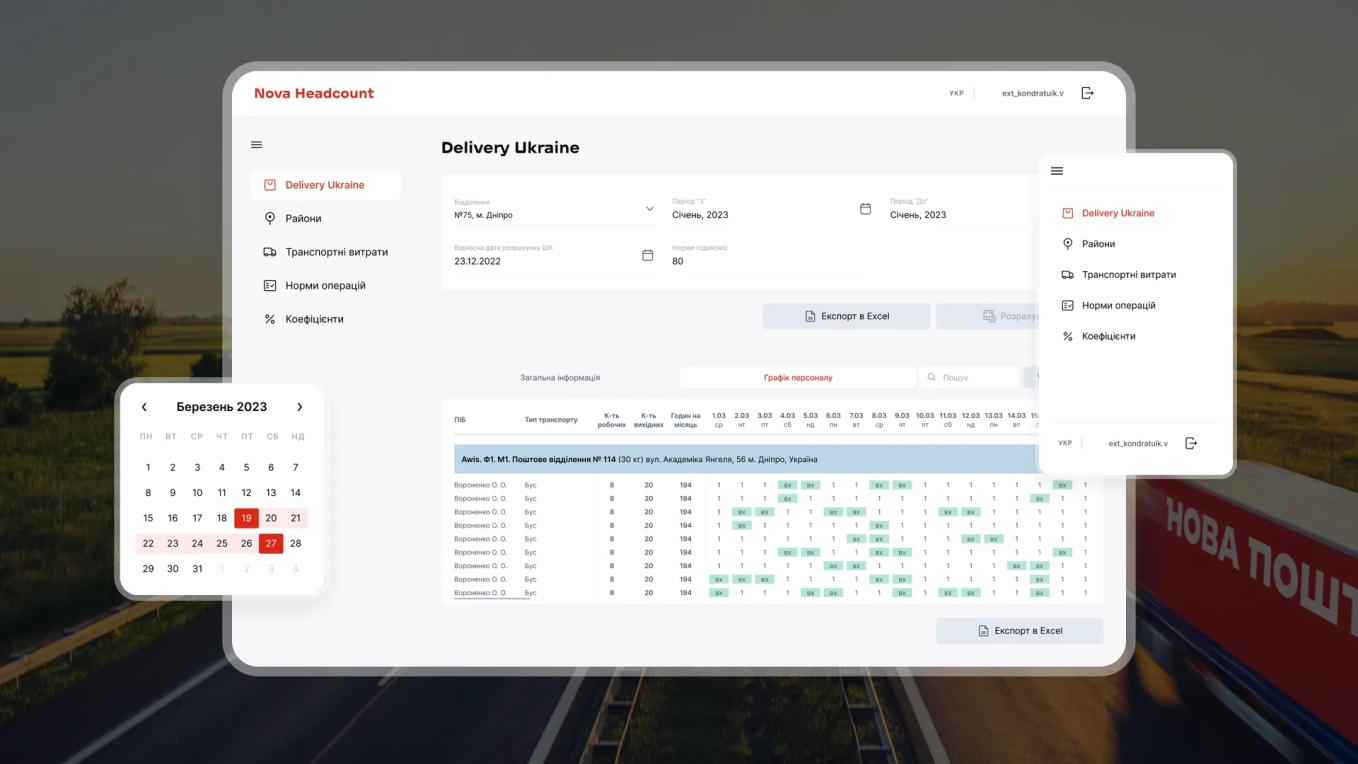 Read the full case study
Read the full case study
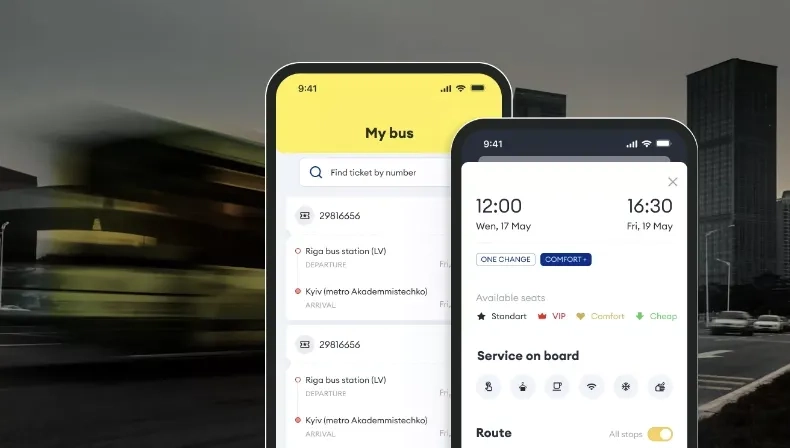 Read the full case study
Read the full case study


